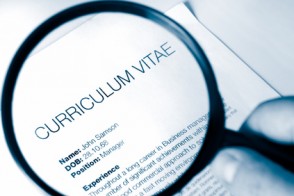Your resume is the holy grail of documents in your job search or career change. It covers your education, training and relevant work experience and skills. In order for your resume to be effective, it should not only describe who you are professionally, but it should also emphasize how your skills match those required for the job.
If you're at a bit of a loss with your resume writing, consult these resume FAQs:
1.What do I need to include in my resume?
Personal details
If you're going to have any chance at getting the job, the recruiter needs to be able to contact you so be sure to include all your relevant contact information such as: Full name, address, telephone and mobile numbers and your e-mail address.
Regarding e-mail addresses, it's very important to use a professional sounding account that largely resembles your real name. Personal accounts with names like rugbyfan2014@email.com aren't going to impress your potential employer. So if you haven't got one, make sure you get one. Something like charlotte.williams@email.com is perfect.
Education and/or Training
Starting with your most recent studies, summarize your education and training history. Include all experiences relevant to the job your applying for, especially any on-the-job training you may have. Again, it's important not to pad out your resume, so list only the most relevant experiences and if you're not 100% convinced that it's persuasive enough, take a look at the ‘structure' section for a few structural techniques you can employ to improve your resume.
Employment History
As with the education and training section, all experiences should be summarized in reverse-chronological order. Be sure to include your job title and the dates you worked there, the employer or company name and the responsibilities you had. You may also wish to include some key achievements such as any awards you were nominated for or won, or perhaps you helped the company gain a certain amount of profit due to your actions.
Ensure you highlight the skills you have learnt from each and every experience and indeed how these skills would be useful for the job role you're applying for.
If you're fortunate enough to have many, varied past work experiences, it may be a good idea to organize these according to skill. Here, you could list those jobs with the same skill set under ‘related work experience' and the rest as ‘other work experience'
Additional experience
It's also worth thinking about any additional experience or skills you may have gained from hobbies or clubs you're part of. For example if you're applying for a supervisor role but with no prior work experience, you may have learned similar leadership skills from your time as a guitar tutor.
3. Is there anything I shouldn't include?
There are a few things that aren't necessarily vital on your resume, or perhaps details you'd rather keep a little more private. Consult our article "What not to include in your resume"
4. How should I structure my resume?
Concerning the personal details section, it's a good idea to put them in the document header, ensuring that they'll then appear on each page of your resume, while also taking up less room on your page, giving space for more important past experiences.
List everything in reverse-chronological order, meaning the most recent experience is listed first. There's no set order for your sections. This way, you can tailor your cv (link) to the job you're your applying for by putting the most relevant section first. For example if you're an under-graduate applying for a sales assistant job while in university, your past experiences at other retail stores are more relevant than your current studies. In this case you can put your work history first. If however, you're applying for an entry-level job related to your studies, it's likely your educational history and university studies are more relevant.
Ensure you number your pages, even if your resume covers only one page. In this way, if your resume is one page and it's clearly marked as only being one page, recruiters know they are looking at the whole document. Conversely, if you have a number of pages, a recruiter can easily identify if they are missing a page of your document and therefore are missing valuable information about you.
5.How many pages should my resume fill?
It's important to emphasize that your resume is not an exhaustive list of everything you've done professionally and in education up until this date. People often fret over the length of their resume and question how long a resume should be. A Google search will give you varying answers from ‘no more than one page' to ‘4 pages should be fine'.
In reality, anything from 1 to 4 pages is fine, so long as everything you mention is relevant. Quality wins over quantity. So instead of worrying about how many pages you're filling, instead ask yourself the following questions when thinking of including past work or educational experience:
• How relevant is this experience to the job?
• What transferable skills do I have from this experience that would help me in this new job?
• What are the similarities between this experience and the job I'm applying for? (eg responsibilities, processes, problems etc)
It's also very important you don't try and pad out your resume by including any and every past professional experience you have. For example, when applying for an IT programming job, any prior experience as a baby-sitter managing 3 young children isn't relevant and wont help you land this new job.
6. When should I change my resume?
You should change and tweak your resume for every job you apply to, to ensure that it's the most relevant for each application that it can be. The focus here is to really target the recruiter. Every job at every company you apply to is unique, and therefore it's requirements are unique. Whether it be the required skill set, expected prior experience or even company culture, no job is exactly the same so your applications shouldn't be the same either.
Your resume and cover letter come together to make a complete application and that application is your one tool to convince the recruiter to hire you. The more you tailor your application to a recruiter, the more convincing it is, hence the more chance you have at landing the job. If this job is worth your time, creating the perfect application should be worth your time also.









What do you think about it? Share it with us!